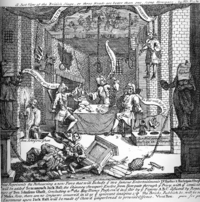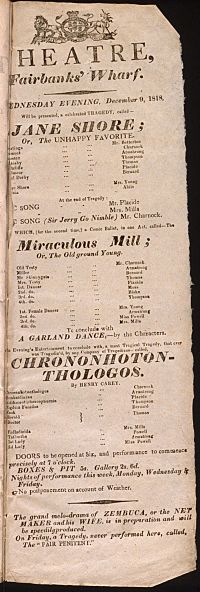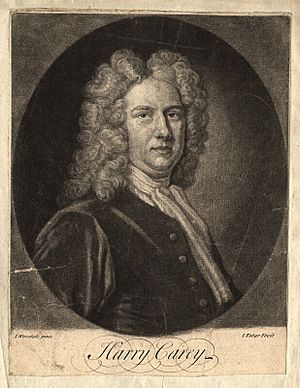Henry Carey (writer) facts for kids
Henry Carey (born around August 26, 1687 – died October 5, 1743) was a talented English poet, writer for plays, and songwriter. People remember him for making fun of the government leader Robert Walpole and for being a strong supporter of his country. Many of his songs are still sung today. People praised him a lot after he died.
Henry Carey often worked without putting his name on his creations. He would sell his songs to others who would then claim them as their own. This makes it hard for experts today to know for sure which poems and music were truly his. However, he wrote many songs and ballads under his own name. He also wrote the words for almost all of these songs. Besides music, he created many operas and plays. His life shows what it was like to be a professional writer in the early 1700s. He didn't have family money or a special title. He wrote for money in all kinds of ways. Even so, he kept his own political views and managed to criticize the government of his time. He was also a key figure in a new movement that celebrated being "Patriotic" in plays.
Contents
Who Was Henry Carey?
Henry Carey was born in London. It is believed that his father was George Savile, 1st Marquess of Halifax. Carey himself never said this directly. However, he named three of his sons "Savile." These names matched the births of Halifax's own three sons. Also, Carey dedicated all his main works to Halifax. A magazine called The Gentleman's Magazine once said that Carey received "generous payments" from the Savile family. But this seems unlikely and has not been proven. The fact that Carey wrote for money even when his plays were very popular suggests he didn't have a steady income from the Savile family.
Besides rumors, it's hard to be sure about Carey's parents. It's possible that Henry and Mary Carey, both school teachers, were his parents. His first job was as a music teacher at a boarding school. This school was for children of middle-class families. He held this job while also working as a writer. So, these two Careys are the most likely people to have raised him, even if they weren't his birth parents.
Early Music and Writing Career
It's tough for experts to find Carey's first works. This is because he probably wrote them without his name on them. He often worked as a "helper" for other writers. He was writing for money even when his plays were successful. This means he likely started hiring out his writing skills quite early.
In the 1700s, he did simple writing jobs for newspapers and magazines. His first known work was a weekly story series. It was called Records of Love and came out from January to March 1710. This story was for women readers. It expected them to be smart, educated, and numerous. He also sang Italian and English songs between acts at the Theatre Royal, Drury Lane around 1710. His first book of poems came out in 1713. It was called Poems on Several Occasions. This was when the Tory government under Queen Anne was at its strongest.
In 1714, Carey worked as a psalmist (someone who sings psalms) at Lincoln's Inn church and also at Drury Lane. He performed there with his music students. The Tory government lost power when Queen Anne died. Robert Walpole's Whigs then started to gain power. Leaders of the old government were accused of serious crimes against the country. One leader, Robert Harley, 1st Earl of Oxford, was put in the Tower of London.
In 1715, Carey wrote his first play, a short one called The Contrivances. On July 13, 1717, Carey lost both his jobs at Drury Lane and Lincoln's Inn. This happened because of a political statement he made. Harley had just been freed from the Tower. He attended Lincoln's Inn Church. Carey then set Psalm 124 to a happy, celebratory tune and sang it. The Psalm talks about people escaping danger. It says:
- "If it had not been the Lord who was on our side, when men rose up against us:
- Then they had swallowed us up quick, when their wrath was kindled against us:
- Then the waters had overwhelmed us, the stream had gone over our soul."
It ends with: "Our soul is escaped as a bird out of the snare of the fowlers: the snare is broken, and we are escaped."

Even though Carey lost his jobs, he was soon back at Drury Lane. He married Elizabeth Pearks in September. He put on his second play, Hanging and Marriage, in 1722. In 1723 and 1724, London theaters were full of pantomime and big showy plays. This even made a young artist named William Hogarth draw funny pictures about plays being replaced by puppets. Carey wrote music for some of these shows. In 1723, he wrote music for Harlequin Dr. Faustus at Drury Lane. From 1723 to 1733, Carey was the main composer for Drury Lane. He wrote and performed much of the music played between acts, before the show, and at the end. He also wrote music for dances and other fun parts of the plays.
Henry Carey never stopped being a composer, singer, or musician. Even as he became more successful as a poet and playwright, he kept working in music. He worked in a theater linked to the Whig party. Yet, Carey seemed to clearly support the Tory government and writers like Alexander Pope. So, when Pope made fun of the empty pantomime stage in The Dunciad, he was aiming at the idea of spectacle replacing real plays, not at the musicians.
Satire and "Namby Pamby"
His poem, Namby Pamby (1725), made fun of Ambrose Philips. Philips was often a target of Alexander Pope's jokes. Philips had written poems for "all persons," from Robert Walpole to mothers in nurseries. The nursery poems gave Carey the idea to make fun of them. Philips used a short, choppy line in his poems. Carey cleverly said that the short line matched Philips's silly ideas. The poem was so popular that Carey himself became known as "Namby Pamby Carey." The term "namby pamby" then became widely used to describe anything silly or weak. "Sally in Our Alley", another one of Carey's songs, was also a huge hit. Many singers have performed it even up to today.
After Namby Pamby, Carey was a well-known figure among those who didn't like Robert Walpole. The poem had been praised by Alexander Pope. Carey admired and bought tickets to Handel's operas. But, like John Gay and Alexander Pope, he thought the opera stars were sometimes ridiculous. So, he started making fun of opera in 1726. That year, he wrote Faustina, or, the Roman Songstress. This play made fun of Faustina Bordoni. Faustina was famously fighting with another singer, Francesca Cuzzoni. They even got into a physical fight during a Handel performance the next year. The year after, he wrote Mocking is Catching to make fun of Senesino, another Italian opera star.
In 1730, he added music and songs to his earlier play, Hanging and Marriage. He put the play on again as The Clown's Stratagem. He used the same basic story again with new music for Betty, or, The Country Bumpkins in 1732. These two things—a love for opera but frustration with its problems, and a love for his country but frustration with Walpole's policies—showed up in all of Carey's professional works.
In the same year, Carey might have been the first to sing "God Save the King" at a meeting of the Patriot Whig group. There is some reason to believe he wrote the song. A newspaper from 1795 said that Henry Carey came to a musician named John Christopher Smith with the words and tune of the song. Carey asked Smith to fix the bass part, which Smith did. The earliest printed version of "God Save the King" seems to be from the early 1740s.
Carey as a Playwright Who Used Satire

As a playwright, Carey was important in bringing back satire in plays during the 1730s. After Namby Pamby was a hit, older, clever Tory writers liked Carey. After John Gay created the ballad opera with The Beggar's Opera, Carey started writing musical comedies that made fun of things. He wrote a lot of music and some play scripts for other writers during this time.
In 1732, J. F. Lampe, Thomas Arne, J. C. Smith, and Henry Carey started the English Opera project. Their goal was to bring back serious opera in English. Together, they formed the English Opera Company. Carey wrote two opera scripts for them. One was for Amelia (with music by Lampe). It was performed at the Little Theatre at The Haymarket, a theater favored by writers who opposed the government. The other was Teraminta (with music by Smith). It was performed at Lincoln's Inn Fields. Amelia was very popular, but the opera company didn't last.
Carey had made fun of foreign opera. In 1734, he turned his attention to badly written, mass-produced serious plays. Chrononhotonthologos was a parody of overly dramatic plays. It especially made fun of the silly spectacle plays he had worked on at Drury Lane. The play was bold because it made fun of Caroline of Ansbach and George II of the United Kingdom. The Queen was criticized for her alliance with Robert Walpole. The play also had a lot of music by Carey. People who supported Carey understood the hidden criticisms in the play. But it could also be seen as just a funny play with nonsense verse. He followed this with the musical comedy The Honest Yorkshire-Man.
Carey's attempt to bring back serious, patriotic English opera didn't work. However, his attempts to make fun of opera through parody and satire did. In 1737, he turned a Lincolnshire folk ballad into a full mock-opera called The Dragon of Wantley. This was a new step. It started with a folk song and changed it into an opera. The play, with music by John Frederick Lampe, made fun of empty opera traditions. It also aimed a satirical jab at Robert Walpole and his tax policies. The play was a huge success. It ran for sixty-nine performances in its first season. This was even more than The Beggar's Opera. The play first opened at the Haymarket, where its hidden attack on Walpole would have been clear. But its long run happened after it moved to Covent Garden, which could stage much bigger shows. Part of its satire was that all the words were sung, including the talking parts and the main songs. The play itself is very short to read. It relied a lot on funny acting, dances, and other visual entertainment.
From 1737 to 1740, he wrote The Musical Century in one Hundred English Ballads in two books. Even though Carey complained that his enemies called him "Ballad-maker," the work was later praised. In the 1800s, people thought even more highly of Carey's clear, simple, and memorable ballad tunes. Also in 1738, he helped start the Fund for Decayed Musicians. He also produced Margery, or, a Worse Plague than the Dragon, a follow-up to The Dragon of Wantley.
He had another popular success in 1739 with Nancy, or, The Parting Lovers. This was a patriotic play about a sailor leaving his girlfriend to fight against the Spanish. As with other works, Carey's main point was about love for his country. Patriotic plays at the time often questioned official government policies. Nancy was written and had music by Carey. Its main characters are a sailor, Nancy, and a Press Gang officer (who forced men into the navy). The play was new because it directly dealt with a current social issue through song.
Death
Carey's son, Charles, died in 1743. Carey himself died at his home in London later that year. He was buried in St James Churchyard, Clerkenwell.
His daughter Anne became an actress. She had a son, Edmund Carey, who later became the famous actor Edmund Kean.
Why Henry Carey Was Important
Some people have said Henry Carey's work was not very serious, even in his own time. He was incredibly good at creating melodies and playing with words. Later writers, like Edward Lear, looked to Carey as an inspiration for his tongue twisters and nonsense poems in Namby Pamby and Chrononhotonthologos. At the same time, Carey's plays were known in his day for being politically smart and brave. He was willing to speak his mind and face the results of his beliefs. But he made his political points in a fun and seemingly lighthearted way. This allowed his friends to appreciate his politics and his enemies to dismiss his humor.
Experts who study music have recognized the special skills needed for Carey's music. Theater historians are also starting to understand the time and place of his plays. He wrote more English songs than anyone else between 1715 and 1740. He wrote his own words for all but twelve of his two hundred and fifty songs. He helped connect the singing style of Henry Purcell to the later style of Arne. He did this by mixing popular English folk songs and tavern songs with Italian musical touches.
 | William M. Jackson |
 | Juan E. Gilbert |
 | Neil deGrasse Tyson |


